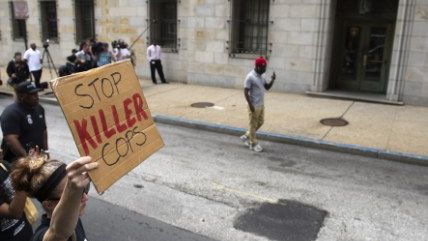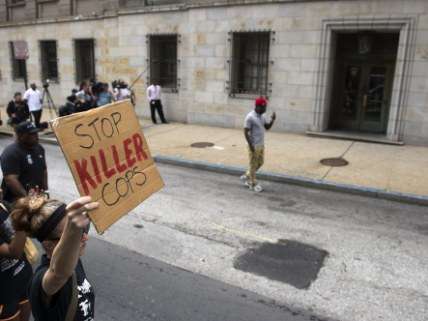Another Officer Acquitted in Freddie Gray Case
Judge clears Lt. Brian Rice of all charges


This morning a judge acquitted a Baltimore Police officer of all charges of misconduct in connection with the death of Freddie Gray, who died of injuries he sustained while cuffed, but not secured, in a police van last year.
Lt. Brian Rice asked for a judge to hear his case rather than a full jury trial. Judge Barry Williams cleared Rice of all charges, which included involuntary manslaughter, reckless endangerment, and misconduct in office. The same judge cleared two other officers of all charges earlier in the year.
Thus far, prosecutors in Baltimore have failed to secure any convictions for misconduct in the Gray case. There are two more officers facing charges (and one who may be retried after a hung jury led to a mistrial previously). The Baltimore Sun notes that state prosecutor Marilyn Mosby is being pressured to drop the remaining cases, given the failures to land any convictions.
Though prosecutors may not be able to land convictions, the treatment that led to Gray's death are hardly new or unfamiliar. There's even a name for it—the "nickel ride"—where police deliberately place a suspect in restraints in a vehicle but don't secure him with seat belts, resulting in him getting bounced around and injured during a lengthy drive around the city.
That it's difficult to prove deliberate intent in such a case is likely exactly why nickel rides happen. The likely outcome here is more tweaking of police policies to try to manage police conduct when securing prisoners in vehicles. But as Ed Krayewski has noted, Baltimore's use of force policies leave much to the discretion of police officers, and it's very clear that the discretion of officers behaving "reasonably" played a major role in the officers' defense. There is a cottage industry in making pretty much any behavior by a police officer seem "reasonable" simply by arguing the officer was concerned for his own safety.
Police abuse and now targeted violence against police officers have heightened the most useless parts of this argument—who is more of a victim of this dynamic and who is really the racist and the current level of extremely vicious identity politics. The debate then gets pulled away from a discussion of how much urban policing is really about centralized planning that puts officers in the position of not just fighting crime with identifiable victims, but enforcing regulatory policies designed to raise tax revenue or eliminate behaviors city leaders (and those who influenced them) find distasteful. And in this particular case, the tone of the argument also pulls away from reforms that would end or at least diminish the role of public safety unions in keeping bad police officers form being removed from the force. It may be a reasonable—albeit disappointing—outcome that prosecutors are unable to prove that the recklessness that led to Gray's death rises to criminal intent. That doesn't mean that the city should be unable to get rid of officers who are shown to engage in behavior that endangers the public.
